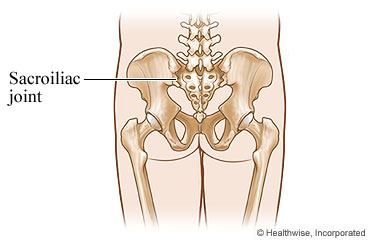Sacroiliac Joint Pain: Care Instructions
Overview

The sacroiliac joints connect the spine and each side of the pelvis. These joints bear the weight and stress
of your torso.
Stress on the sacroiliac joints can cause joint pain. This joint pain is more common during pregnancy.
Certain kinds of arthritis also may cause this type of joint pain.
Home treatment may help you feel better. So can avoiding activities that stress your back. Your doctor also
may recommend physical therapy. This may include doing exercises and stretches to help with pain. You may also
learn to use good posture.
Follow-up care is a key part of your treatment and safety. Be sure to make and go to all
appointments, and call your doctor if you are having problems. It's also a good idea to know your test results
and keep a list of the medicines you take.
How can you care for yourself at home?
-
Ask your doctor about light exercises that may help your back pain. Try to do light activity throughout
the day. Find a comfortable position for rest, but don't stay in one position for too long. Avoid activities
that cause pain.
-
To apply heat, put a warm water bottle, a heating pad set on low, or a warm cloth on your back. Do not go
to sleep with a heating pad on your skin.
-
Put ice or a cold pack on your back for 10 to 20 minutes at a time. Put a thin cloth between the ice and
your skin.
-
If the doctor gave you a prescription medicine for pain, take it as prescribed.
-
If you are not taking a prescription pain medicine, ask your doctor if you can take an over-the-counter
pain medicine, such as acetaminophen (Tylenol), ibuprofen (Advil, Motrin), or naproxen (Aleve). Read and
follow all instructions on the label. Take pain medicines exactly as directed.
-
Do not take two or more pain medicines at the same time unless the doctor told you to. Many pain medicines
have acetaminophen, which is Tylenol. Too much acetaminophen (Tylenol) can be harmful.
-
To prevent future back pain, do exercises to stretch and strengthen your back and stomach. Learn how to
use good posture, safe lifting techniques, and proper body mechanics.
When should you call for help?
 Call 911
anytime you think you may need emergency care. For example, call if:
Call 911
anytime you think you may need emergency care. For example, call if:
Call your doctor now or seek immediate medical care if:
Watch closely for changes in your health, and be sure to contact your doctor if:
Current as of: July 17, 2023
Content Version: 14.0
Care instructions adapted under license by your
healthcare professional. If you have questions about a medical condition or this instruction, always ask
your healthcare professional. Healthwise, Incorporated disclaims any warranty or liability for your use of
this information.